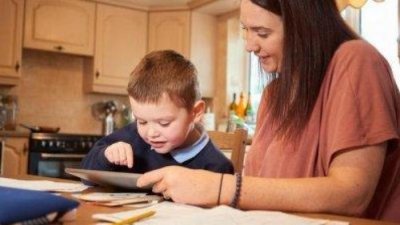Lithuanian app helps children with language disorders to communicate
Do you know how children with language disorders communicate? The Alternative Communication - Symbol System method has been developed to help children who are unable to express their thoughts properly in words. The idea is to help the child to express his or her thoughts by using paper cards with different pictures on which the child can put together word combinations to communicate with others.
Professionals and parents of children with special needs face difficulties both in caring for and in understanding the wishes and thoughts of such children. The modernising world is integrating more and more rapidly into different areas of life, with technology helping not only to identify but also to solve today's pressing problems. That's why Nareka, a company that develops innovative electronic solutions in all the Baltic States, has developed a mobile app called LingoLT, which helps children with language disorders, their parents and the professionals who work with them to communicate more effectively and easily.
"The LingoLT app is a communication aid for people (usually children) with language disorders and difficulties expressing themselves verbally. The mobile app allows you to do away with quickly worn out, easily lost paper cards and communicate freely whenever your child wants to. The app works in the same way as paper cards, but the difference is that the app pronounces the symbols chosen by the child and arranged in a sequence or combination of words in a human voice.
Active consultations with specialists in special needs education and child development and psychologists have shown that for children with verbal language difficulties, it is very important which voice in the app says the words they want to say for them. The choice of voice was found to depend not only on the child's character, but also on family relationships. Child behavior experts have found that, depending on the adults in their environment, children tend not to choose a voice that they associate with negative emotions. For children with verbal language difficulties, the choice of a female voiceover in the app is calming and allows them to express their thoughts more openly and broadly. The male voice, on the other hand, adds confidence and reassurance.
LingoLT developers have trained more than 600 professionals, travelled to more than 30 municipalities and organised educational events in them. The result is a clear contribution of the app to communication with the non-speaking child and a steadily growing number of active users, which has now reached more than 1500.
"This is a sensitive issue related to communication with children with language disorders, which has long been the subject of limited approaches to communication skills training. Educational events to introduce and train the mobile app have brought together a large number of professionals and interested users in many Lithuanian municipalities. It is gratifying to see the great interest in our solution for facilitating children's communication and the confirmation of the benefits of the app by professionals working in the field and parents of non-speaking children," says Paul, the creator of the LingoLT application.
The aim of LingoLT is to educate the public and professionals working in the field of special needs education about the development of a useful tool that will help improve the language skills of the target group (i.e. children with verbal language disorders).
The LingoLT app is available for both Android and iOS platforms. You can download it to your smart device from the Google Play Store or the App Store, depending on your device.
The project is supervised by the Central Project Management Agency (CPVA). The total funding for the development of the LingoLT app is €239 476.67 from European Economic Area Financial Mechanism‘s Health Programme.
About the Health Programme
The European Economic Area Financial Mechanism's Health Programme in Lithuania aims to strengthen mental health services in communities and improve the well-being of children and young people. The programme's various measures include the development of psychosocial support, youth-friendly health services, support for vulnerable children and young people, the establishment of one-stop help centres for children and families, training for parents under the 'Incredible Years' programme, cooperation between families and health professionals, and the development of services and support for pregnant women, mothers in labour, and mothers of children up to the age of two. In total, more than €17.9 million has been earmarked for the Health Programme for 2014-2021. The implementation of the projects is overseen by the Central Project Management Agency (CPVA).

 All programmes
All programmes
 Health
Health
 Social Dialogue-Decent work
Social Dialogue-Decent work
 Business Development, Innovation and SMEs
Business Development, Innovation and SMEs
 Research
Research
 Civil society
Civil society
 Justice and Home Affairs
Justice and Home Affairs
 Culture
Culture
 Environment, Energy, Climate Change
Environment, Energy, Climate Change
 Fund for bilateral relations
Fund for bilateral relations
